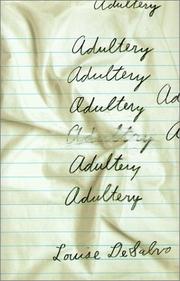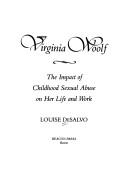| Listing 1 - 9 of 9 |
Sort by
|
Book
ISBN: 0333293533 Year: 1980 Publisher: London : Macmillan,
Abstract | Keywords | Export | Availability | Bookmark
 Loading...
Loading...Choose an application
- Reference Manager
- EndNote
- RefWorks (Direct export to RefWorks)
Book
ISBN: 0823279308 0823279294 0823279316 Year: 2018 Publisher: New York : Fordham University Press,
Abstract | Keywords | Export | Availability | Bookmark
 Loading...
Loading...Choose an application
- Reference Manager
- EndNote
- RefWorks (Direct export to RefWorks)
"As the child of children of immigrants, Louise DeSalvo was at first reluctant to write about her truths. Her abusive father, her sister's suicide, her illness. In this stunning collection of her captivating and frank essays on her life and her Italian-American culture, Louise DeSalvo centers on her beginnings, reframing and revising her acclaimed memoiristic essays, pieces that were the seeds of longer collections, to reveal her true power as a memoirist: the ability to dig ever deeper for personal and political truths that illuminate what it means to be a woman, a child of Italian immigrants, a writer, and a scholar"--
Critics --- English literature --- Authors, American --- Italian American women --- Italian American families --- Appreciation --- DeSalvo, Louise A., --- Family. --- Families, Italian American --- Italian Americans --- Families --- Women, Italian American --- Women --- American authors
Book
ISBN: 9783596105663 3596105668 Year: 1994 Publisher: Frankfurt am Main: Fischer,
Abstract | Keywords | Export | Availability | Bookmark
 Loading...
Loading...Choose an application
- Reference Manager
- EndNote
- RefWorks (Direct export to RefWorks)

ISBN: 0807062243 Year: 1999 Publisher: Boston Beacon
Abstract | Keywords | Export | Availability | Bookmark
 Loading...
Loading...Choose an application
- Reference Manager
- EndNote
- RefWorks (Direct export to RefWorks)
By filtering the story of her own husband's affair through others' stories, DeSalvo revels in the always-exciting fantasy of adultery and reels from its usually painful reality. While she recognizes the seduction of the Madame Bovary risk-all-for-passion story of adultery, she shows that it is not the only one. Everyone knows how dangerous it is to tell their adultery stories. Here, Louise DeSalvo risks all in the company of Edith Wharton, Virginia Woolf, Henry Miller, and Madame Recamier. This treatise is at once a memoir and a cultural study, a literary exploration and a survivor's manual. For anyone who has experienced adultery --from either side-- De Salvo offers a sexy, nonjudgemental, realistic vision of fidelity and marriage.
Book
ISBN: 0823268748 9780823268740 9780823268733 082326873X 9780823268849 0823268845 9780823268719 0823268713 Year: 2015 Publisher: New York
Abstract | Keywords | Export | Availability | Bookmark
 Loading...
Loading...Choose an application
- Reference Manager
- EndNote
- RefWorks (Direct export to RefWorks)
"When literary biographer and memoirist Louise DeSalvo embarked upon a journey to learn why her father came home from World War II a changed man, she didn't realize her quest would take ten years, and that it would yield more revelations about the man--and herself--and the effect of his military service upon their family than she'd ever imagined. During his last years, as he told her about his life, DeSalvo began to understand that her obsession with war novels and military history wasn't merely academic but rooted in her desire to understand this complex father whom she both adored and reviled because of his mistreatment of her. Although she at first believes she wants to uncover his story, the story of a man who was no hero but who was nonetheless adversely affected by his military service, she learns that what she really wants is to recover the man that he was before he went away. As DeSalvo and her father uncover his past piece-by-piece, bit-by-bit, she learns about the dreams of a working-class man who entered the military in the late 1930's during peacetime to better himself, a man who wanted to become a pilot. She learns about what it was like for him to participate in war games in the Pacific prior to the war, and its devastating toll. She learns about what it was like for her parents to fall in love, set up house, marry, and have children during this cataclysmic time. And as the pieces of her father's life fall into place as works to piece together the puzzle of everything she's learned about this time, she finds herself finally able to understand him. Chasing Ghosts is an original contribution to the understanding of working-class World War II veterans who did not conventionally distinguish themselves through 'heroic' actions and whose lives were not until recently considered worthy of historical or cultural attention. It personalizes the history of those sailors who served in the Navy aboard aircraft carriers and on islands in the Pacific prior to, and during World War II and contributes to the current vital conversation about the often-unrecognized effects of war and its traumas upon those men and their families. It reveals the lifelong devastating consequences of military service on those men and women who fell in love, married, and set up house. And it reveals the complexity of what it is like to be the daughter of a father who has gone to war"--Provided by publisher. "Chasing Ghosts describes how, near the end of his life, the daughter of a veteran of World War II comes to terms with her father, emotionally wounded by his military service through the stories he tells her about his childhood, about his military service in the Navy in the late 1930's, and about his wartime experiences and through her research undertaken to understand her father's life in the context of history. Told through the voice of a daughter seeking answers to her father's life, the narrator journeys into her father's history and the context in which it enfolds. She learns that her father's response had been a mixture of rage and silence and she begins to understand why he has chosen her as an object of his abuse. The narrative provides an understanding of working-class World War II veterans who performed the behind-the-scenes work, like the narrator's father's work as an aviation machinist's mate, necessary to waging war--work that was not conventionally heroic or, until recently, considered worthy of historical or cultural attention. By juxtaposing historical moments in her family's and the country's life, Chasing Ghosts engages in the current necessary conversation about the often unrecognized effects of war and its trauma on World War II veterans, and reinterprets the experience of her father and other such veterans in the context of contemporary understanding about the psychic cost of war and its cross-generational impact on families. In the process, the narrator's lack of knowledge is replaced with empathy for what he's experienced and an understanding of his place in history"--
World War, 1939-1945 --- Sailors --- Working class men --- Fathers and daughters --- Veterans --- Family relationships --- Psychological aspects. --- DeSalvo, Louise A., --- Family. --- Childhood and youth.

ISBN: 0807063266 Year: 1989 Publisher: Beacon press
Abstract | Keywords | Export | Availability | Bookmark
 Loading...
Loading...Choose an application
- Reference Manager
- EndNote
- RefWorks (Direct export to RefWorks)
Children in literature --- Families in literature --- Incest victims --- Novelists, English --- Psychoanalysis and literature --- Psychological fiction, English --- Sexually abused children --- History and criticism --- Woolf, Virginia, --- Childhood and youth. --- Psychology.
Book
ISBN: 0823279324 9780823279326 9780823279319 0823279316 9780823279302 0823279308 9780823279296 Year: 2018 Publisher: New York
Abstract | Keywords | Export | Availability | Bookmark
 Loading...
Loading...Choose an application
- Reference Manager
- EndNote
- RefWorks (Direct export to RefWorks)
WINNER OF THE IASA BOOK AWARD!AMERICAN BOOK AWARD WINNER!As the child of children of immigrants, Louise DeSalvo was at first reluctant to write about her truths. Her abusive father, her sister’s suicide, her illness. In this stunning collection of her captivating and frank essays on her life and her Italian-American culture, Louise DeSalvo centers on her beginnings, reframing and revising her acclaimed memoiristic essays, pieces that were the seeds of longer collections, to reveal her true power as a memoirist: the ability to dig ever deeper for personal and political truths that illuminate what it means to be a woman, a second-generation American, a writer, and a scholar. Each essay is driven by a complex inquiry that examines the personal, familial, social, ethnic, and historical dimensions of identity. Collectively, they constitute a story significantly different from DeSalvo’s memoirs when they first published, where the starkness of their meaning became blunted by material surrounding them. DeSalvo has also restored material written and then deleted—experiences she was too reticent to reveal before, in writing about her sister’s suicide, her husband’s adultery, her own sexual assault. The essays also include new material to shift the ballast of an essay as her life has changed significantly through the years. The House of Early Sorrows is a courageous exploration not only of the DeSalvo’s family life and times, but also of our own.
American essays --- Italian Americans. --- Italian-American. --- death. --- family. --- illness. --- memoir, Italian immigrants, adultery.
Book
ISBN: 0807083259 Year: 1989 Publisher: Boston : Beacon Press,
Abstract | Keywords | Export | Availability | Bookmark
 Loading...
Loading...Choose an application
- Reference Manager
- EndNote
- RefWorks (Direct export to RefWorks)
Book
ISBN: 0091585503 Year: 1984 Publisher: Hutchinson
Abstract | Keywords | Export | Availability | Bookmark
 Loading...
Loading...Choose an application
- Reference Manager
- EndNote
- RefWorks (Direct export to RefWorks)
| Listing 1 - 9 of 9 |
Sort by
|

 Search
Search Feedback
Feedback About UniCat
About UniCat  Help
Help News
News